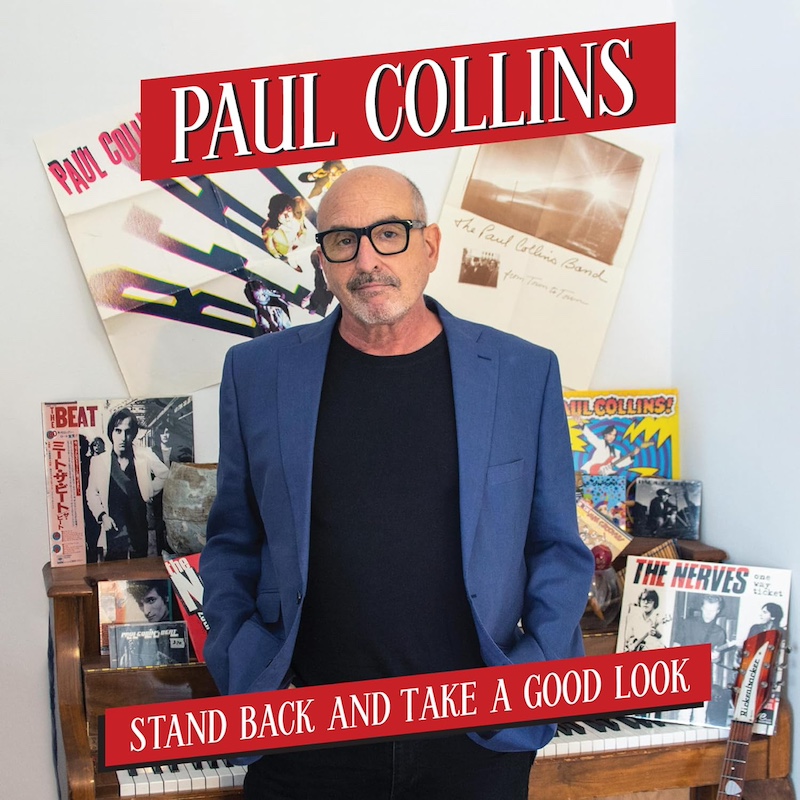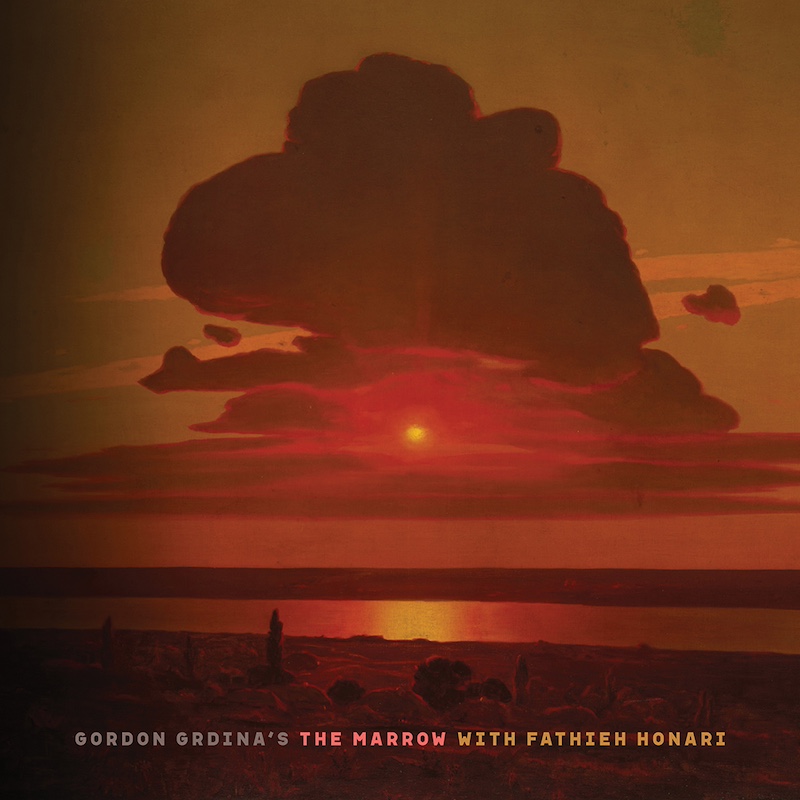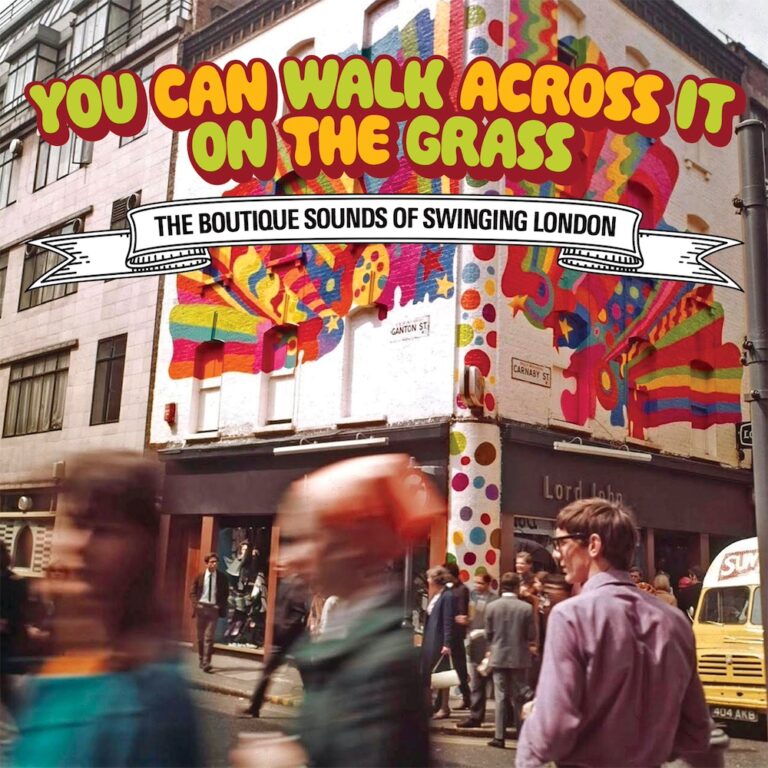After the Beatles conquered the world, the world turned its eyes to the Fab Four’s home country and particularly to London, which became, like San Francisco in the States, a hotbed for music, culture, and fashion. A new three-CD anthology called You Can Walk Across It on the Grass: The Boutique Sounds of Swinging London collects songs from this place and time.
The clamshell-boxed set includes material originally issued between 1963 and 1968 plus a few contemporaneous, previously unreleased numbers. And, according to an essay in an accompanying 48-page booklet, it “celebrates the music that gave the scene its soundtrack: a heady brew of mod-friendly soul/jazz/R&B heard nightly in the clubs, the chart-storming supersonic pop blaring out from the pirate stations, the cult TV/movie themes and library tunes, the cocky male soloists, the mini-skirted dolly bird singers, the cheesy, cheeky, kinky novelty songs.”
In fact, many of these tunes are too obscure to qualify as the soundtrack of this scene, but as the quote above suggests, this is certainly a disparate collection. One minute, you’re listening to John Mayall and Eric Clapton’s guitar-driven “Little Girl” or the Merseys’ rock gem, “Sorrow,” which is featured here in its demo version. The next, you might hear elevator music like “On the Ball (Theme for the World Cup)” by the Johnny Schroeder Orchestra or a puerile novelty like Patrick Macnee and Honor Blackman’s “Kinky Boots.”
A few of the numbers were international hits that will be familiar to American listeners, such as “Dedicated Follower of Fashion,” by the Kinks; “Friday on My Mind,” by the Easybeats, an Australian group that recorded in London; and “I Can’t Control Myself,” by the Troggs. In other cases, Stateside listeners will likely know the song but not the artist, or vice versa.
“Little Games,” the title cut of a Yardbirds album, appears here in a version by a singer named Des James, for example, while the Beach Boys’ “Girl Don’t Tell Me” and “I’m Waiting for the Day” show up, respectively, in covers by a group known as Tony Rivers & the Castaways and a singer called Katherine Farthing (aka Peanut). Conversely, Petula Clark is represented not by any of her more than a dozen American hits but by a cover of “England Swings,” the Top 10 Roger Miller recording; the Caravelles, who scored with “You Don’t Have to Be a Baby to Cry,” offer the similar-sounding but rarely heard “Don’t Blow Your Cool”; and the original, R&B-leaning Moody Blues deliver “Lose Your Money (But Don’t Lose Your Mind)” rather than “Go Now,” their big hit from this period.
None of the anthology’s recordings mentioned in the previous paragraph dented the charts on either side of the Atlantic, so even listeners in the U.K. might not be familiar with them. And that’s true for quite a few of the other tracks here as well, many of which issued from little-known bands such as the Knack (not to be confused with the hit-making American outfit of the same name), the Shots, Dave Anthony’s Moods, and the Hi-Fis.
OK, so maybe this isn’t quite the soundtrack of late 1960s swinging London. The good news is that much of the material is as notable as it is obscure. Among the many highlights: “Mockingbird,” soul singer Glenda Collins’s Joe Meek–produced cover of the Inez and Charlie Foxx hit; “In My Lonely Room,” the Action’s soulful reading of a Holland/Dozier/Holland song that provided a single for Martha & the Vandellas; “Chills and Fever,” which features what may be the wildest vocal ever recorded by Welsh singer Tom Jones; a fine, sax-spiced version of “I Wanna Be (Your Everything)” by Jamaica native Jimmy James; “Haven’t They Got Better Things to Do,” a garage rock entry from a band known as the Profile; and “Where Did My Heart Go,” a catchy pop rocker from a group called the Good Time Losers.
Also Noteworthy

Paul Collins, Stand Back and Take a Good Look. Multi-instrumentalist Paul Collins’s career began in the mid-1970s with a stint as the drummer in the short-lived power-pop trio the Nerves, which also featured Peter Case and Jack Lee (author of Blondie’s “Hanging on the Telephone”). Since then, Collins has released well over a dozen albums with various aggregations and as a soloist.
He’s had some good moments, but none greater than this latest power-pop effort, which delivers a large dose of addictive ear candy. Expect ringing guitars, hooks galore, and indelible melodies. Nearly every track is a standout but particularly memorable are such tracks as “I’m the Only One for You,” which features the late, great Dwight Twilley; the passionate, lilting “Under the Spanish Sun”; the exhilarating, upbeat “You Can’t Go Back” and “In Another World”; and “Liverpool,” in which Collins evokes a three-day layover in that city and recalls “standing where the Beatles stood.”
The only thing wrong with this album is that it’s all over in a mere 33 minutes. You can always hit “Repeat,” though, and to paraphrase the old Fritos chips commercial, bet you can’t play it just once.

Gordon Grdina, The Marrow with Fathieh Honari. Reportedly conceived as a way to meld the “worlds of Arabic, jazz, and improvised music,” this gorgeous and adventurous album features five players: Gordon Grdina (guitar, oud), who wrote some of the material; Hank Roberts (cello); Mark Helias (bass); Hamin Honari (percussion); and Honari’s mother, Persian singer Fathieh Honari, whose haunting work enriches every track. Combining Iranian popular music of the mid 20th-century, 13th-century Persian poetry, and modern improvisational jazz was quite a gamble, but it pays major dividends on this mesmerizing release.
Jeff Burger’s website, byjeffburger.com, contains five decades’ worth of music reviews, interviews, and commentary. His books include Dylan on Dylan: Interviews and Encounters, Lennon on Lennon: Conversations with John Lennon, Leonard Cohen on Leonard Cohen: Interviews and Encounters, and Springsteen on Springsteen: Interviews, Speeches, and Encounters.



